Careers in Dentistry
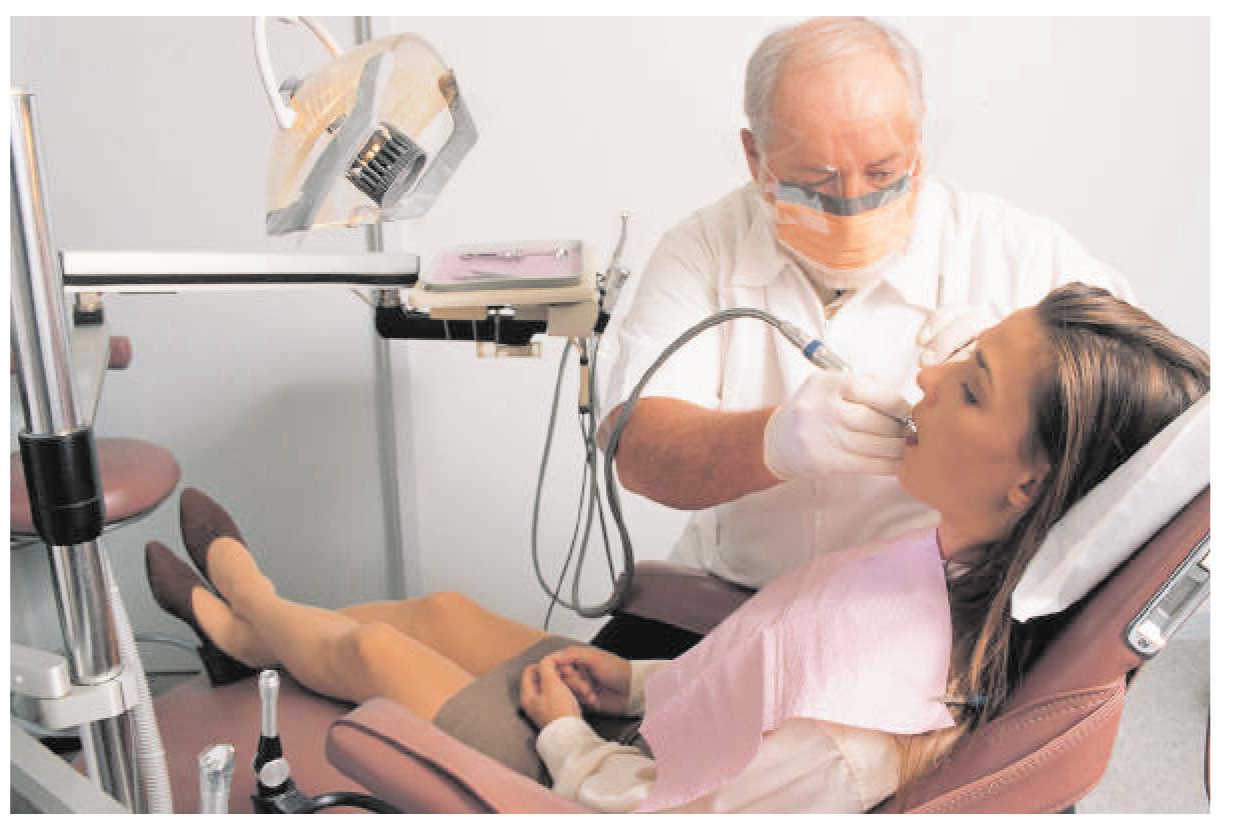
DENTIST
A dentist is trained and licensed to practice the diagnosis, treatment and prevention of diseases, injuries and malformations of the teeth, jaw and mouth. Most dentists practice general dentistry, giving them the capability to provide comprehensive care to a variety of patients.
Some dentists choose to limit their practices to a recognized dental specialty:
- Endodontics
- Oral and Maxillofacial Surgery
- Oral and Maxillofacial Radiology
- Oral and Maxillofacial Pathology
- Orthodontics
- Pediatric Dentistry
- Periodontics
- Prosthodontics
- Public Health Dentistry
If you are in high school, enroll in college preparatory classes in chemistry, biology and algebra. Receive a broad exposure to science and math. A well-rounded liberal arts education is also desirable. If you are currently in college, build a solid foundation in the natural sciences – especially general biology and inorganic chemistry. Psychology and business courses can also provide background important to your success as a dentist. You don’t have to major in science, but you will need to complete the pre-dental science courses.
Dental School Curriculum
A dental education requires a bachelor’s degree and four years of dental school. If you decide to go into one of the nine specialties, you’ll need a minimum of two years additional schooling. Dental schools grant doctoral degrees in Dental Science. When researching this subject, it is recommended you contact several dental schools. Talk about specific requirements with their admissions officers.
Tuition and Financial Assistance
Although dental school may seem expensive, recent studies indicate dental school is an excellent investment. In addition to tuition, the cost of dental education includes books, fees, instruments and living expenses. Many students cover educational expenses through readily available loans, limited scholarships and grants.
Rewards
Besides prestige, flexibility and personal fulfillment, dentistry offers a variety of challenges and excitement.
Contact Information
California Dental Association
www.cda.org
American Dental Association
www.ada.org
Dental Board of California
www.dbc.ca.gov
California dental schools
Linda University (LLU) – School of Dentistry
www.llu.edu/llu/dentistry
University of California, Los Angeles (UCLA) – School of Dentistry
www.dent.ucla.edu
University of California, San Francisco (UCSF) – School of Dentistry
www.dentistry.ucsf.edu
University of the Pacific (UOP) – School of Dentistry
www.dental.uop.edu
University of Southern California (USC) – School of Dentistry
www.usc.edu
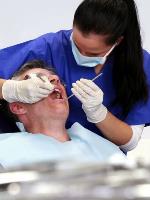
DENTAL HYGIENIST
Dental hygienists work with the dentist to provide comprehensive dental care to patients. A career in dental hygiene offers variety and personal satisfaction.
Dental hygienists clean teeth and provide preventive dental care, as well as teach patients how to practice good oral hygiene. They examine patients’ teeth and gums, recording the presence of diseases or abnormalities. They may explain the relationship between diet and oral health and educate patients on how to properly brush and floss teeth. Hygienists use rotary, hand instruments, take X-rays, and may administer local anesthetics in some states.
Professional Outlook
Dental hygiene is projected to be one of the 30 fastest growing professions. Employment of dental hygienists is expected to continue to grow. This is due to a combination of factors such as; people are retaining their natural teeth longer and are aware of the importance of regular dental care. As the dentists’ workload increases, they are expected to hire more hygienists to perform preventive dental care. Additionally, employment opportunities may include research, teaching or marketing.
Education
A career in dental hygiene requires a minimum of two years of college education. Some dental hygiene programs are longer than two years and may culminate in a baccalaureate degree.
Because the dental hygiene education program includes dental and basic science courses, high school preparation should include biology and chemistry.
Contact Information
California Dental Association
www.cda.org
American Dental Association
www.ada.org
American Dental Hygienists’ Association
www.adha.org
California Dental Hygienists Association
www.cdha.org
Committee on Dental Auxiliaries
www.comda.ca.gov
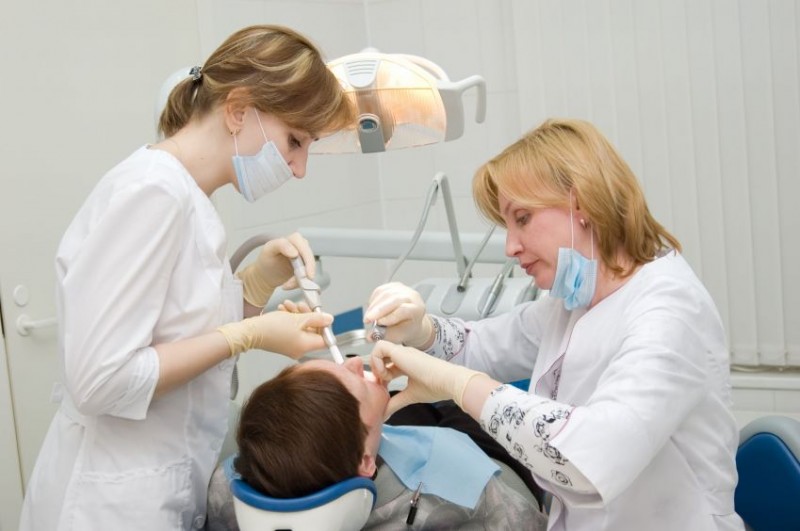
DENTAL ASSISTANT
Dental assistants work alongside the dentist and assist with a variety of dental services. With the greater retention of natural teeth, the demand for dental services is increasing, thereby creating more opportunities for dental assistants. Dentists are expected to hire more assistants to meet the needs of California’s growing population.
Dental assistants can begin their careers without a college degree through on-the-job training or a formal education program. Since dental assistants are in demand, career options include both full-time and part-time positions.
Specific tasks dental assistants are trained to perform may include:
- Taking and processing X-rays
- Assisting the dentist at chairside with the delivery of instruments and preparation of dental materials
- Counseling patients about preventive dental care and nutrition
- Operatory and instrument infection control
- Performing a variety of office management tasks
Professional Outlook
A dental assistant usually works in the offices of general dentists or speciality dentists.
Other areas include dental schools, health clinics and public health departments. Salaries typically are based upon the responsibilities associated with the specific position and the geographical location of employment.
Educational Requirements
- On-the job training
- Community/Junior colleges
- Vocational/Technical schools
- Regional Occupational programs
Contact Information
California Dental Association
www.cda.org
American Dental Assistants Association
www.dentalassistant.org
American Dental Association
www.ada.org
Committee on Dental Auxiliaries
www.comda.ca.gov
Dental Assisting National Board
www.danb.org
California Dental Assistants Association
www.cdaaweb.org
CharterCollege (Canyon Country)
www.chartercollege.edu/locations/canyon-country-ca
North-West College (Glendale)
www.northwestcollege.com
San Joaquin Valley College (San Joaquin)
www.sjvc.edu/programs/medical-and-dental/dental-assistant
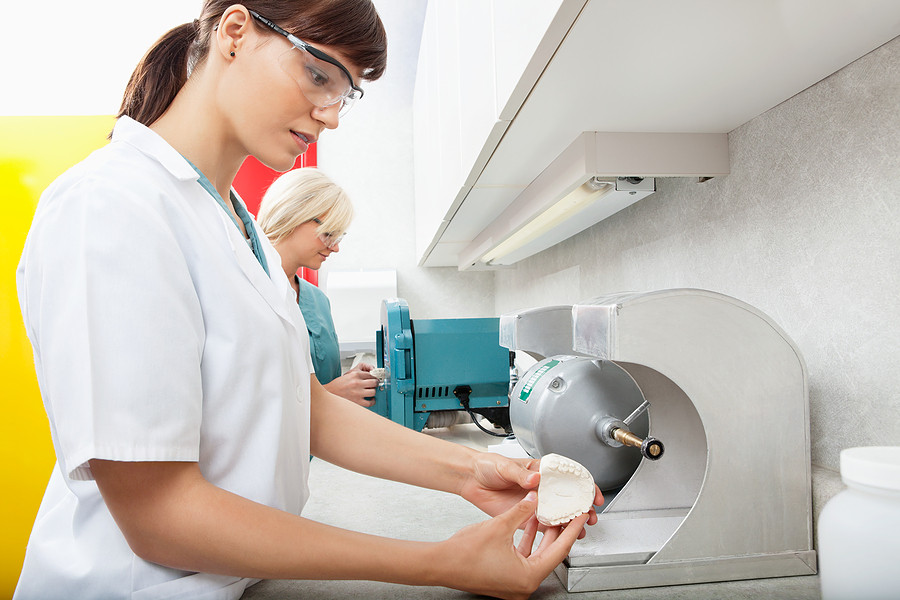
DENTAL LABORATORY TECHNICIAN
A dental laboratory technician makes dental prostheses, which are replacements for natural teeth to help people eat, chew, talk or smile. The dental laboratory technician needs artistic aptitude for detailed and precise work, manual dexterity and skill in using small hand instruments and equipment. Technicians are valuable members of the dental care team although they rarely work directly with patients. They receive instruction from dentists by following written instructions and using impressions (molds) of the patient’s teeth or soft tissue to create full dentures, crowns, bridges or orthodontic appliances. They often perform much of their work without close supervision.
- Some duties of a dental laboratory technician may include:
- Fabricates fixed bridges, partials, dentures, veneers and crowns
- Create orthodontic appliances and splints to help straighten and protect teeth
- Work with materials such as waxes, plastics, precious and non-precious alloys, stainless steel, a variety of porcelains and composites, or polymer glass combinations
Educational requirements could include:
- Community college/ course work
- Vocational/technical school/ education and training
- Apprenticeships
- On-the-job training
Professional Outlook:
Experienced technicians can find well-paid positions in commercial laboratories based on their technical or communication skills, become a member of a larger laboratory team, or potentially start their own laboratories. Technicians may teach dental technology courses through educational programs. They may apply their knowledge to research, sales and/or marketing of prosthetic materials, equipment or instruments.
Services performed by dental technicians will always be needed. As the population grows older, the demand for prostheses (which improves patients’ nutrition, appearance and ability to speak clearly) will continue to rise.
Contact Information
California Dental Association
www.cda.org
American Dental Association
www.ada.org
California Dental Laboratory Association
www.cdla.org
California Dental Laboratory Owners’ Association
www.dloac.org
National Association of Dental Laboratories
www.nadl.org
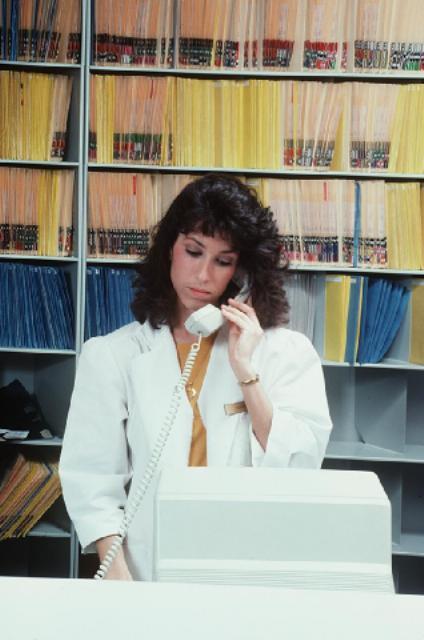
DENTAL PRACTICE OFFICE STAFF
Staff members employed in administrative positions often create the public’s first impression of the dental practice.
Responsibilities may include telephone communication, appointment scheduling, insurance claims management, financial arrangements and collections, treatment plan presentations, personnel management, and practice marketing. Larger practices often have several administrators who specialize in these various duties. Dedication to customer service is essential for success in modern dental practice administration.
Education
Educational requirements for those employed in dental practice administration ranges from on-the-job training to master’s degrees, depending on the specific employment responsibilities. Many administrators also find that clinical dental experience is helpful in their positions. Those interested in this field should be familiar with basic dental procedures and terminology, communication skills, computer utilization and general business knowledge.
Contact Information
California Dental Association
www.cda.org
American Dental Association
www.ada.org
Dental Board of California
www.dbc.ca.gov

